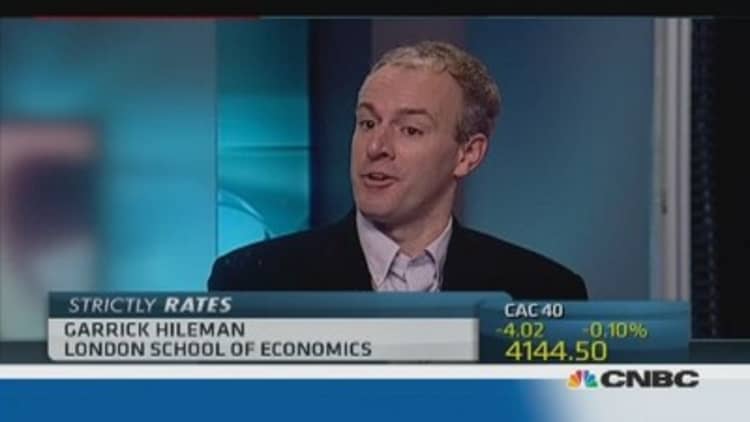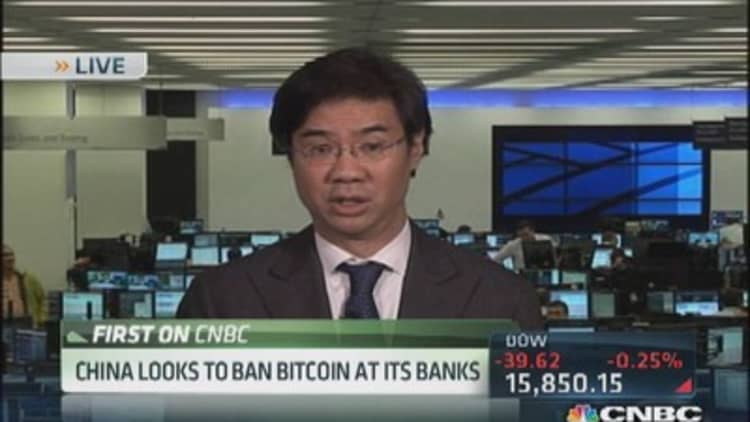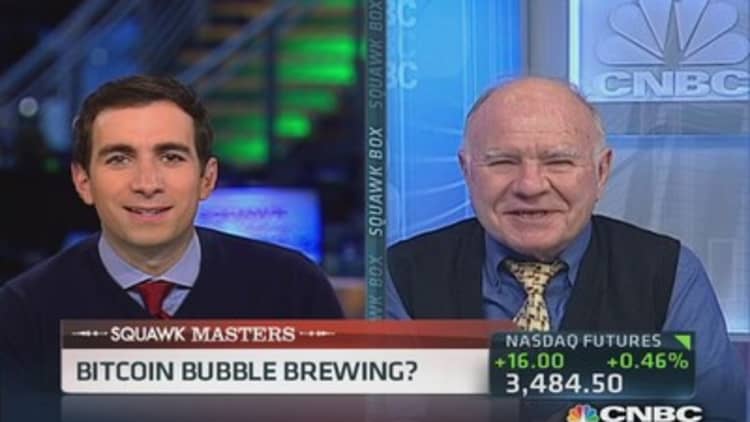
Virtual currency bitcoin lost around $200 in value on Thursday after the People's Bank of China outlawed the country's banks from using it, leading some to cash in on their investments.
At around 8 a.m. London time, the price of a bitcoin sharply dipped by 20 percent back below the $1,000 level it reached around one week ago. At midday London time, the currency was trading at $980 on major exchange Mt Gox and $932 on CoinDesk's index, which measures a basket of prices around the world.
The fall in the price coincided with a statement released on the website of the China's central bank which warned of the risks that the cryptocurrency posed. It warned that Chinese financial institutions should not trade the digital currency saying that while it does not yet pose a threat to China's financial system, it carries risks.
(Read More: Could China make or break bitcoin?)

"It's easy for ordinary investors who blindly follow (the currency) to easily suffer heavy losses," the bank said. The statement, in response to questions posed by the media, detailed its volatility and its risks regarding price speculation. It added that it could be exploited by criminals and facilitate money laundering and terrorist financing activities.
With this in mind, the central bank said it was barring financial and payment institutions from using bitcoin, including buying and selling or insuring bitcoin-linked products. It added that ordinary individuals were free to use bitcoin but it had no legal status in the country.
Bitcoin is a "virtual" currency that allows users to exchange online credits for goods and services. While there is no central bank that issues them, bitcoins can be created online by using a computer to complete difficult tasks, a process known as mining. Some 12 million bitcoins are believed to be in circulation, with a cap of 21 million—meaning no more bitcoins can created after that point.
(Read More: Buyer beware: Bitcoin's fate could rest with China)
Its recent surge over $1,000 is seen by many as being accelerated by interest in China as well as favorable comments by regulatory officials at a U.S. Senate hearing in November. Former Federal Reserve Vice Chairman Alan Blinder has been quoted as saying that the cryptocurrency shows "promise".
BTC China is now the world's biggest bitcoin exchange, according to Bitcoinity.org, with around 500,000 bitcoins having been exchanged last week - 30 percent of the market share.
(Read More: Baidu division now accepting bitcoins)

The Chinese exchange is now believed to have the highest number of registered users and received $5 million in funding last week from institutional investors Lightspeed China Partners and Lightspeed Venture Partners. Other major exchanges are located in Japan and in Eastern Europe.
Chinese search engine Baidu announced in October that it had started to accept bitcoin for its security service. This came after predominant Chinese state television company CCTV broadcast a documentary detailing the digital currency in the Summer. Many analysts see that as a key point at which interest in the bitcoin increased.
Downloads of bitcoin wallets surged in China in the few days following the documentary, according to statistics from SourceForge, rising to second place in the global ranking behind the United States. Bitcoincharts.com has data that shows the Chinese yuan is now the second most traded currency pair with bitcoin after the U.S. dollar.
(Read More: Bitcoin—the world's best boost to a brand?)
Meanwhile, the Bank of France also warned Thursday of the risks that the currency posed saying users may find it difficult to convert to real money.
Garrick Hileman, an economic historian at the London School of Economics said that the sharp move downwards wasn't entirely unexpected.
"We anticipated that there might be a significant reaction in China," he told CNBC. "There's a lot of risk to the Chinese capital control regime."
What was most interesting for Hileman is that instead of the selling being confined to China, investors around the globe followed suit and the price depreciated because of this.
By CNBC.com's Matt Clinch. Follow him on Twitter @mattclinch81


